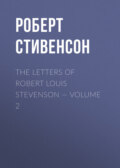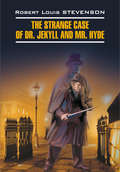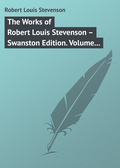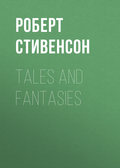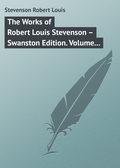
Роберт Льюис Стивенсон
The Works of Robert Louis Stevenson – Swanston Edition. Volume 23
To Mrs. Sitwell
Edinburgh [Sunday, November 1874].
Here is my long story: yesterday night, after having supped, I grew so restless that I was obliged to go out in search of some excitement. There was a half-moon lying over on its back, and incredibly bright in the midst of a faint grey sky set with faint stars: a very inartistic moon, that would have damned a picture.
At the most populous place of the city I found a little boy, three years old perhaps, half frantic with terror, and crying to every one for his “Mammy.” This was about eleven, mark you. People stopped and spoke to him, and then went on, leaving him more frightened than before. But I and a good-humoured mechanic came up together; and I instantly developed a latent faculty for setting the hearts of children at rest. Master Tommy Murphy (such was his name) soon stopped crying, and allowed me to take him up and carry him; and the mechanic and I trudged away along Princes Street to find his parents. I was soon so tired that I had to ask the mechanic to carry the bairn; and you should have seen the puzzled contempt with which he looked at me, for knocking in so soon. He was a good fellow, however, although very impracticable and sentimental; and he soon bethought him that Master Murphy might catch cold after his excitement, so we wrapped him up in my greatcoat. “Tobauga (Tobago) Street” was the address he gave us; and we deposited him in a little grocer’s shop and went through all the houses in the street without being able to find any one of the name of Murphy. Then I set off to the head police office, leaving my greatcoat in pawn about Master Murphy’s person. As I went down one of the lowest streets in the town, I saw a little bit of life that struck me. It was now half-past twelve, a little shop stood still half-open, and a boy of four or five years old was walking up and down before it imitating cockcrow. He was the only living creature within sight.
At the police offices no word of Master Murphy’s parents; so I went back empty-handed. The good groceress, who had kept her shop open all this time, could keep the child no longer; her father, bad with bronchitis, said he must forth. So I got a large scone with currants in it, wrapped my coat about Tommy, got him up on my arm, and away to the police office with him: not very easy in my mind, for the poor child, young as he was – he could scarce speak – was full of terror for the “office,” as he called it. He was now very grave and quiet and communicative with me; told me how his father thrashed him, and divers household matters. Whenever he saw a woman on our way he looked after her over my shoulder and then gave his judgment: “That’s no her,” adding sometimes, “She has a wean wi’ her.” Meantime I was telling him how I was going to take him to a gentleman who would find out his mother for him quicker than ever I could, and how he must not be afraid of him, but be brave, as he had been with me. We had just arrived at our destination – we were just under the lamp – when he looked me in the face and said appealingly, “He’ll no put me in the office?” And I had to assure him that he would not, even as I pushed open the door and took him in.
The serjeant was very nice, and I got Tommy comfortably seated on a bench, and spirited him up with good words and the scone with the currants in it; and then, telling him I was just going out to look for Mammy, I got my greatcoat and slipped away.
Poor little boy! he was not called for, I learn, until ten this morning. This is very ill written, and I’ve missed half that was picturesque in it; but to say truth, I am very tired and sleepy: it was two before I got to bed. However, you see, I had my excitement.
Monday.– I have written nothing all morning; I cannot settle to it. Yes – I will though.
10.45. – And I did. I want to say something more to you about the three women. I wonder so much why they should have been women, and halt between two opinions in the matter. Sometimes I think it is because they were made by a man for men; sometimes, again, I think there is an abstract reason for it, and there is something more substantive about a woman than ever there can be about a man. I can conceive a great mythical woman, living alone among inaccessible mountain-tops or in some lost island in the pagan seas, and ask no more. Whereas if I hear of a Hercules, I ask after Iole or Dejanira. I cannot think him a man without women. But I can think of these three deep-breasted women, living out all their days on remote hilltops, seeing the white dawn and the purple even, and the world outspread before them for ever, and no more to them for ever than a sight of the eyes, a hearing of the ears, a far-away interest of the inflexible heart, not pausing, not pitying, but austere with a holy austerity, rigid with a calm and passionless rigidity; and I find them none the less women to the end.
And think, if one could love a woman like that once, see her once grow pale with passion, and once wring your lips out upon hers, would it not be a small thing to die? Not that there is not a passion of a quite other sort, much less epic, far more dramatic and intimate, that comes out of the very frailty of perishable women; out of the lines of suffering that we see written about their eyes, and that we may wipe out if it were but for a moment; out of the thin hands, wrought and tempered in agony to a fineness of perception, that the indifferent or the merely happy cannot know; out of the tragedy that lies about such a love, and the pathetic incompleteness. This is another thing, and perhaps it is a higher. I look over my shoulder at the three great headless Madonnas, and they look back at me and do not move; see me, and through and over me, the foul life of the city dying to its embers already as the night draws on; and over miles and miles of silent country, set here and there with lit towns, thundered through here and there with night expresses scattering fire and smoke; and away to the ends of the earth, and the furthest star, and the blank regions of nothing; and they are not moved. My quiet, great-kneed, deep-breasted, well-draped ladies of Necessity, I give my heart to you!
R. L. S.
To Mrs. Sitwell
[Edinburgh] December 23, 1874.
Monday.– I have come from a concert, and the concert was rather a disappointment. Not so my afternoon skating – Duddingston, our big loch, is bearing; and I wish you could have seen it this afternoon, covered with people, in thin driving snow flurries, the big hill grim and white and alpine overhead in the thick air, and the road up the gorge, as it were into the heart of it, dotted black with traffic. Moreover, I can skate a little bit; and what one can do is always pleasant to do.
Tuesday.– I got your letter to-day, and was so glad thereof. It was of good omen to me also. I worked from ten to one (my classes are suspended now for Xmas holidays), and wrote four or five Portfolio pages of my Buckinghamshire affair. Then I went to Duddingston and skated all afternoon. If you had seen the moon rising, a perfect sphere of smoky gold, in the dark air above the trees, and the white loch thick with skaters, and the great hill, snow-sprinkled, overhead! It was a sight for a king.
Wednesday.– I stayed on Duddingston to-day till after nightfall. The little booths that hucksters set up round the edge were marked each one by its little lamp. There were some fires too; and the light, and the shadows of the people who stood round them to warm themselves, made a strange pattern all round on the snow-covered ice. A few people with torches began to travel up and down the ice, a lit circle travelling along with them over the snow. A gigantic moon rose, meanwhile, over the trees and the kirk on the promontory among perturbed and vacillating clouds.
The walk home was very solemn and strange. Once, through a broken gorge, we had a glimpse of a little space of mackerel sky, moon-litten, on the other side of the hill; the broken ridges standing grey and spectral between; and the hilltop over all, snow-white, and strangely magnified in size.
This must go to you to-morrow, so that you may read it on Christmas Day for company. I hope it may be good company to you.
Thursday.– Outside, it snows thick and steadily. The gardens before our house are now a wonderful fairy forest. And O, this whiteness of things, how I love it, how it sends the blood about my body! Maurice de Guérin hated snow; what a fool he must have been! Somebody tried to put me out of conceit with it by saying that people were lost in it. As if people don’t get lost in love, too, and die of devotion to art; as if everything worth were not an occasion to some people’s end.
What a wintry letter this is! Only I think it is winter seen from the inside of a warm greatcoat. And there is, at least, a warm heart about it somewhere. Do you know, what they say in Xmas stories is true. I think one loves their friends more dearly at this season. – Ever your faithful friend,
Robert Louis Stevenson.
To Mrs. Sitwell
The Portfolio article here mentioned is An Autumn Effect (see Essays of Travel). The Italian story so delightedly begun was by and by condemned and destroyed like all the others of this time.
[Edinburgh, January 1875], Monday.
Have come from a concert. Sinico sang, tant bien que mal, “Ah perfido spergiuro!”; and then we had the Eroica symphony (No. 3). I can, and need, say no more; I am rapt out of earth by it; Beethoven is certainly the greatest man the world has yet produced. I wonder, is there anything so superb – I can find no word for it more specific than superb – all I know is that all my knowledge is transcended. I finished to-day and sent off (and a mighty mean detail it is, to set down after Beethoven’s grand passion) my Portfolio article about Buckinghamshire. In its own way I believe it to be a good thing; and I hope you will find something in it to like; it touches, in a dry enough manner, upon most things under heaven, and if you like me, I think you ought to like this intellectual – no, I withdraw the word – this artistic dog of mine. Thaw – thaw – thaw, up here; and farewell skating, and farewell the clear dry air and the wide, bright, white snow-surface, and all that was so pleasant in the past.
Wednesday.– Yesterday I wasn’t well and to-night I have been ever so busy. There came a note from the Academy, sent by John H. Ingram, the editor of the edition of Poe’s works I have been reviewing, challenging me to find any more faults. I have found nearly sixty; so I may be happy; but that makes me none the less sleepy; so I must go to bed.
Friday.– I am awfully out of the humour to write; I am very inert although quite happy; I am informed by those who are more expert that I am bilious. Bien; let it be so; I am still content; and though I can do no original work, I get forward making notes for my Knox at a good trot.
Saturday.– I am so happy. I am no longer here in Edinburgh. I have been all yesterday evening and this forenoon in Italy, four hundred years ago, with one Sannazzaro, a sculptor, painter, poet, etc., and one Ippolita, a beautiful Duchess. O I like it badly! I wish you could hear it at once; or rather I wish you could see it immediately in beautiful type on such a page as it ought to be, in my first little volume of stories. What a change this is from collecting dull notes for John Knox, as I have been all the early part of the week – the difference between life and death. – I am quite well again and in such happy spirits, as who would not be, having spent so much of his time at that convent on the hills with these sweet people. Vous verrez, and if you don’t like this story – well, I give it up if you don’t like it. Not but what there’s a long way to travel yet; I am no farther than the threshold; I have only set the men, and the game has still to be played, and a lot of dim notions must become definite and shapely, and a deal be clear to me that is anything but clear as yet. The story shall be called, I think, When the Devil was well, in allusion to the old proverb.
Good-bye.
Robert Louis Stevenson.
To Sidney Colvin
17 Heriot Row, Edinburgh [January 1875].
MY DEAR COLVIN, – I have worked too hard; I have given myself one day of rest, and that was not enough; so I am giving myself another. I shall go to bed again likewise so soon as this is done, and slumber most potently.
9 P.M. – Slept all afternoon like a lamb.
About my coming south, I think the still small unanswerable voice of coins will make it impossible until the session is over (end of March); but for all that, I think I shall hold out jolly. I do not want you to come and bother yourself; indeed, it is still not quite certain whether my father will be quite fit for you, although I have now no fear of that really. Now don’t take up this wrongly; I wish you could come; and I do not know anything that would make me happier, but I see that it is wrong to expect it, and so I resign myself: some time after. I offered Appleton a series of papers on the modern French school – the Parnassiens, I think they call them – de Banville, Coppée, Soulary, and Sully Prudhomme. But he has not deigned to answer my letter.
I shall have another Portfolio paper so soon as I am done with this story, that has played me out; the story is to be called When the Devil was well: scene, Italy, Renaissance; colour, purely imaginary of course, my own unregenerate idea of what Italy then was. O, when shall I find the story of my dreams, that shall never halt nor wander nor step aside, but go ever before its face, and ever swifter and louder, until the pit receives it, roaring? The Portfolio paper will be about Scotland and England. – Ever yours,
R. L. Stevenson.
To Mrs. Sitwell
[Edinburgh, January 1875.]
I wish I could write better letters to you. Mine must be very dull. I must try to give you news. Well, I was at the annual dinner of my old Academy schoolfellows last night. We sat down ten, out of seventy-two! The others are scattered all over the places of the earth, some in San Francisco, some in New Zealand, some in India, one in the backwoods – it gave one a wide look over the world to hear them talk so. I read them some verses. It is great fun; I always read verses, and in the vinous enthusiasm of the moment they always propose to have them printed; Ce qui n’arrive jamais du reste: in the morning, they are more calm.
Sunday.– It occurs to me that one reason why there is no news in my letters is because there is so little in my life. I always tell you of my concerts: I was at another yesterday afternoon: a recital of Hallé and Norman Neruda. I went in the evening to the pantomime with the Mackintoshes – cousins of mine. Their little boy, aged four, was there for the first time. To see him with his eyes fixed and open like saucers, and never varying his expression save in so far as he might sometimes open his mouth a little wider, was worth the money. He laughed only once – when the giant’s dwarf fed his master as though he were a child. Coming home, he was much interested as to who made the fairies, and wanted to know if they were like berries. I should like to know how much this question was due to the idea of their coming up from under the stage, and how much to a vague idea of rhyme. When he was told that they were not like berries, he then asked if they had not been flowers before they were fairies. It was a good deal in the vein of Herbert Spencer’s primitive man all this.
I am pretty well but have not got back to work much since Tuesday. I work far too hard at the story; but I wish I had finished it before I stopped as I feel somewhat out of the swing now. – Ever your faithful
Robert Louis Stevenson.
To Sidney Colvin
Another of the literary projects which came to naught, no one of the stories mentioned having turned out according to Stevenson’s dream and desire at its first conception, or even having been preserved for use afterwards as the foundation of riper work. “Clytie” is of course the famous Roman bust from the Townley collection in the British Museum.
[Edinburgh, January 1875.]
MY DEAR COLVIN, – Thanks for your letter, I too am in such a state of business that I know not when to find the time to write. Look here – Seeley does not seem to me to have put that paper of mine in this month; so I remain unable to pay you; which is a sad pity and must be forgiven me.
What am I doing? Well I wrote my second John Knox, which is not a bad piece of work for me; begun and finished ready for press in nine days. Then I have since written a story called King Matthias’s Hunting Horn, and I am engaged in finishing another called The Two Falconers of Cairnstane. I find my stories affect me rather more perhaps than is wholesome. I have only been two hours at work to-day, and yet I have been crying and am shaking badly, as you can see in my handwriting, and my back is a bit bad. They give me pleasure though, quite worth all results. However I shall work no more to-day.
I am to get £1000 when I pass Advocate, it seems; which is good.
O I say, will you kindly tell me all about the bust of Clytie.
Then I had the wisdom to stop and look over Japanese picture books until lunch time.
Well, tell me all about Clytie, how old is it, who did it, what’s it about, etc. Send it on a sheet that I can forward without indiscretion to another, as I desire the information for a friend whom I wish to please.
Now, look here. When I have twelve stories ready – these twelve —

– when I have these twelve ready, should I not do better to try to get a publisher for them, call them A Book of Stories and put a good dedicatory letter at the fore end of them. I should get less coin than by going into magazines perhaps; but I should also get more notice, should I not? and so, do better for myself in the long run. Now, should I not? Besides a book with boards is a book with boards, even if it bain’t a very fat one and has no references to Ammianus Marcellinus and German critics at the foot of the pages. On all this, I shall want your serious advice. I am sure I shall stand or fall by the stories; and you’ll think so too, when you see those poor excrescences the two John Knox and Women games. However, judge for yourself and be prudent on my behalf, like a good soul.
Yes, I’ll come to Cambridge then or thereabout, if God doesn’t put a real tangible spoke in my wheel.
My terms with my parents are admirable; we are a very united family.
Good-bye, mon cher, je ne puis plus écrire. I have not quite got over a damned affecting part in my story this morning. O cussed stories, they will never affect any one but me I fear. – Ever yours,
Robert Louis Stevenson.
To Mrs. Sitwell
In the following is related Stevenson’s first introduction to Mr. W. E. Henley. The acquaintance thus formed ripened quickly, as is well known, into a close and stimulating friendship. Of the story called A Country Dance no trace remains.
Edinburgh, Tuesday [February 1875].
I got your nice long gossiping letter to-day – I mean by that that there was more news in it than usual – and so, of course, I am pretty jolly. I am in the house, however, with such a beastly cold in the head. Our east winds begin already to be very cold.
O, I have such a longing for children of my own; and yet I do not think I could bear it if I had one. I fancy I must feel more like a woman than like a man about that. I sometimes hate the children I see on the street – you know what I mean by hate – wish they were somewhere else, and not there to mock me; and sometimes, again, I don’t know how to go by them for the love of them, especially the very wee ones.
Thursday.– I have been still in the house since I wrote, and I have worked. I finished the Italian story; not well, but as well as I can just now; I must go all over it again, some time soon, when I feel in the humour to better and perfect it. And now I have taken up an old story, begun years ago; and I have now re-written all I had written of it then, and mean to finish it. What I have lost and gained is odd. As far as regards simple writing, of course, I am in another world now; but in some things, though more clumsy, I seem to have been freer and more plucky: this is a lesson I have taken to heart. I have got a jolly new name for my old story. I am going to call it A Country Dance; the two heroes keep changing places, you know; and the chapter where the most of this changing goes on is to be called “Up the middle, down the middle.” It will be in six or (perhaps) seven chapters. I have never worked harder in my life than these last four days. If I can only keep it up.
Saturday.– Yesterday, Leslie Stephen, who was down here to lecture, called on me and took me up to see a poor fellow, a sort of poet who writes for him, and who has been eighteen months in our infirmary, and may be, for all I know, eighteen months more. It was very sad to see him there, in a little room with two beds, and a couple of sick children in the other bed; a girl came in to visit the children, and played dominoes on the counterpane with them; the gas flared and crackled, the fire burned in a dull economical way; Stephen and I sat on a couple of chairs, and the poor fellow sat up in his bed with his hair and beard all tangled, and talked as cheerfully as if he had been in a King’s palace, or the great King’s palace of the blue air. He has taught himself two languages since he has been lying there. I shall try to be of use to him.
We have had two beautiful spring days, mild as milk, windy withal, and the sun hot. I dreamed last night I was walking by moonlight round the place where the scene of my story is laid; it was all so quiet and sweet, and the blackbirds were singing as if it was day; it made my heart very cool and happy. – Ever yours,
Robert Louis Stevenson.



